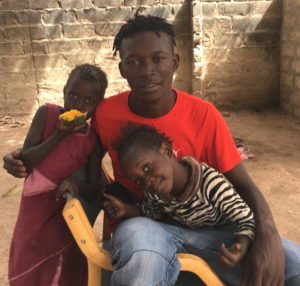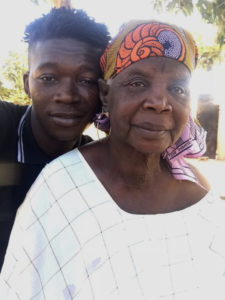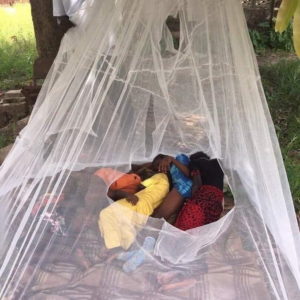 In last week’s letter I mentioned my friend in West Africa. I want to tell you more about him today.
In last week’s letter I mentioned my friend in West Africa. I want to tell you more about him today.
His name is Modoulamin, and he lives on the outskirts of Brikama, one of the few large cities in the nation of The Gambia. He’s twenty years old.
Our conversation began in early March when he responded to a post I made on a social media site, and before long, we became friends, exchanging messages almost daily. I was guarded and cautious, being well aware of online scams. But our exchange was cordial, and he asked nothing from me. He told me about his family and his country and asked about mine.
His English wasn’t perfect, but it was good enough to understand for the most part. He came across as a warm, direct, and remarkably intelligent young man. Only later would I l see how remarkable he truly is. He had made it through the 10th level of school, he said. Then his life took quite a turn. His father disappeared.
Out of sympathy for his circumstances, his school allowed him to continue for a while. But given its own limited resources, the extension of time came to an end, along with his education. He wanted to be a tailor, he said.
 The family never learned what happened to the father. Modoulamin’s mother was pregnant when he disappeared, and shortly after the birth of her child, she contracted malaria and died. It was a devastating loss, and it left seventeen-year-old Modoulamin as the head of the household, with a newborn, three siblings ranging in age from two through twelve, and a grandmother to care for.
The family never learned what happened to the father. Modoulamin’s mother was pregnant when he disappeared, and shortly after the birth of her child, she contracted malaria and died. It was a devastating loss, and it left seventeen-year-old Modoulamin as the head of the household, with a newborn, three siblings ranging in age from two through twelve, and a grandmother to care for.
Raising enough money to provide food for all of them was a great challenge, and soon the family found themselves homeless. They remained homeless for three years. Only a month ago were they able to rent a humble house, with no electricity or water, that serves as shelter.
To support them, Modoulamin walks for two hours each day to a forest where he chops wood to sell at the market so he can buy rice and, if he’s lucky, maybe some small fish and vegetables for their meal. Then he walks home, exhausted, and tends to duties there.
wood to sell at the market so he can buy rice and, if he’s lucky, maybe some small fish and vegetables for their meal. Then he walks home, exhausted, and tends to duties there.
He sent me a photo someone took of him drawing water in a bucket from a stone well to fill a large plastic jug. It would have been, I thought, very heavy to carry. In another photo, he showed me the children sleeping in a huddle inside a torn mosquito netting draped from the limb of a scrawny tree.
“Here we don’t have a tent. We just sleep like this, and at night it is cold, and we have many mosquitoes that cause malaria, which easily kill people,” he said. And the mosquitoes weren’t the only threat. Thieves sometimes killed the homeless, too, just to take their food or money.
When they finally moved into the little house, Modoulamin told me it was the first time the three year old had ever slept under a roof.
Life for him is tedious, an endless struggle to keep his family together and alive. But he perseveres. “Family love is the strongest love,” he told me.
When the corona virus made it to his country, it went into lockdown. Now soldiers were guarding the forest, and to go there would mean a beating and arrest. Meanwhile, Grandmother injured her foot and it became infected, compounding what seemed to be symptoms of malaria. Only with the charity of friends have they been able to survive.
“Such is life, Susan,” Modoulamin said. “God will decide what will happen. But as humans, we have to consider each other’s life and value it as the greatest asset.” This! From a 20-year-old!
The one thing Modoulamin’s parents left to him was their life-long dream. They wanted the family to have their own patch of land, where they could construct a shelter and put in a garden so they could be safe and have food. They worked for it for over twenty years without success, and their dream burns with a passion in Modoulamin’s heart.
This past week, someone in town put a small plot of land up for sale. It’s cheap for the area, only $8,000, near the market, away from the criminal threat, and it has electricity available. If he could buy it, Modoulamin said, he could construct a shelter and the children could work a garden, and he would be able to extend his range in search of work that would provide a dependable living. “Always,” he told me, “I think about how can I get the children into school.”
He hasn’t slept for days, wracking his brain for some way to raise such an impossible sum of money. Was there anything I could do, he asked, knowing that my own circumstances are barely sufficient to cover my needs. Land is demand. He would need to act soon before the opportunity is lost. Did I have any ideas?
To Modoulamin, and to me, $8,000 sounds like eight million. Plus, he tells me, he would need several thousand more to build a protective wall around it. But every day I read about donations far larger being made to causes far less worthy than that of helping my brave and humble young friend achieve his precious dream.
I have set up a GoFundMe page for him now. Maybe it will keep the family fed, pay the rent on the humble shelter he managed to secure, and keep his internet connection intact while he saves toward his dreams.
He uses the Net to work on his education. He’s registered to take classes for his West African Secondary School Education Certificate, and he and I are working together to help him earn his GED. He learned clothing construction in school and loves to design and create clothes. He would like to make that a career.
I know we have around us so many in desperate straits right now. But I think of the starfish story. Remember it?
A young boy was tossing stranded and suffocating starfish into the ocean after a large wave swept them far onto the sand. “You can’t save all those starfish!” a passing man said to him.
“I know,” the boy answered, flinging one into the water. “But I can save this one.”
Maybe Modoulamin can be our starfish. I figure If enough of you reading this toss in a contribution, maybe his whole family can be free to swim. He would do everything in his power to build good lives for them all. And if we can’t raise enough to purchase the little plot of land, at least we might be able to provide him with enough to rent a house for a time. The rainy season is coming.
I told him I would ask you, but that I could make no promises.
“No matter what, we have to be grateful for what we have” he said. “Even the smallest breathing from God is a blessing.”
Please help if you can. And even if you can give no more than your prayers, I thank you from the bottom of my heart.
Warmly,
Susan